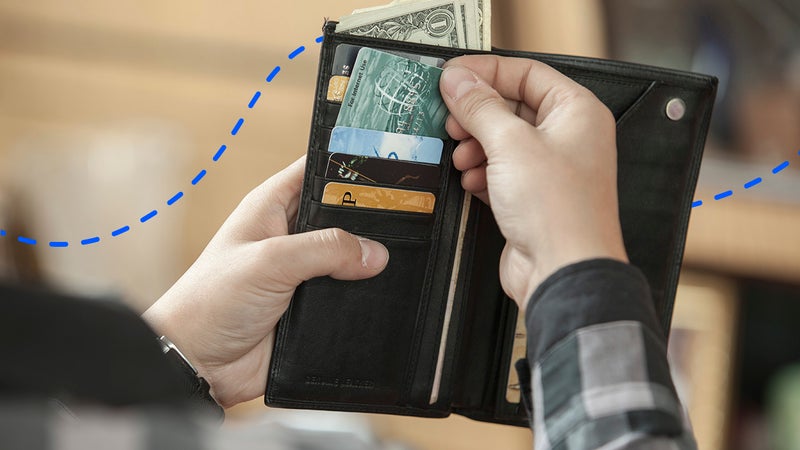How to build credit fast

The Bankrate promise
At Bankrate we strive to help you make smarter financial decisions. While we adhere to strict , this post may contain references to products from our partners. Here's an explanation for . The content on this page is accurate as of the posting date; however, some of the offers mentioned may have expired. Terms apply to the offers listed on this page. Any opinions, analyses, reviews or recommendations expressed in this article are those of the author’s alone, and have not been reviewed, approved or otherwise endorsed by any card issuer.
Key takeaways
- High credit scores come with numerous benefits, such as lower interest rates, larger lines of credit and better rewards.
- Exploring the fastest ways to build credit can help you take advantage of these perks as quickly as possible.
- You’ll need to maintain your credit by making your payments on time and keeping your balances low.
Good credit is the door to many financial opportunities. It gives you access to financing with favorable terms, which means lower interest rates and higher credit limits. Plus, it can lead to reduced insurance premiums and a better chance of rental housing approval. In some cases, you even need credit for utility service approval.
Whether you want to establish a credit profile or have some items to clean up, you need to know how to build credit. “The best advice for rebuilding credit is to manage it responsibly over time,” says Tommy Lee, senior director of analytics science at FICO. Still, some credit-building tactics can have a rapid, positive impact on your score.
No matter where you are in your credit journey, there are ways to build your credit and increase your score fast. Here, you can equip yourself with the knowledge and strategies to establish or boost your credit as quickly as possible.
How fast can you build credit?
How fast you can build credit depends on various factors, including your current score and the strategies you employ. It’s also important to set a goal for what score you need and why.
You can incrementally improve your score within a few months if you:
- Make on-time payments.
- Keep your credit card balances low.
- Diversify your credit accounts.
However, building a solid credit history is a gradual process that takes time and consistent effort. While you can see progress relatively quickly, a high credit score usually requires years of positive credit behavior.
If you need to rebuild credit after a significant negative event like bankruptcy or a defaulted loan, it can take longer.
Keep in mind: Even when you're sprinting toward a higher score, be patient, stay disciplined and track your progress to make adjustments when needed.
9 ways to build credit fast
Credit building is like learning any other new skill: education, practice and patience are keys to mastery. Nonetheless, there are some tactics you can use to build credit pretty quickly, some within a single reporting cycle.
1. Understand the concept of credit
Credit is the ability to borrow money or obtain something of value with the agreement to repay the lender at a later date, typically with interest. This fundamental concept is the foundation of responsible credit management. Before you implement any strategies, learn as much as you can about credit, including:
- Credit repair
- Credit score range
- Factors that affect your credit score
- Reporting basics
- Responsible credit management
- Types of credit
It’s also important to understand each section of your credit report. By familiarizing yourself with the information in your credit report, you can better understand how it impacts your credit score.
2. Check and monitor your credit
Once you understand how to navigate your credit report, you need to check in on it. You can do this as often as every day or as infrequently as once a year. When attempting to build credit fast, more frequent monitoring might be more beneficial.
Check your credit reports at least once a year, even if you believe you have no credit history. Monitoring your credit reports allows you to stay informed about important changes and detect any signs of identity theft. It can also help you discover areas for improvement and see which accounts are reporting and when.
You can access your free annual credit reports from all three bureaus at AnnualCreditReport.com.
For more frequent credit check-ups, check to see if you can get updates from your banking institution or credit card company. You could also use of free or paid credit monitoring services. Expect to pay from $0 to around $140 per year. Whether a paid monitoring platform is worthwhile will depend on your circumstances.
3. Dispute credit report errors
Sometimes, inaccuracies on your credit report are a major reason your credit score is low. Disputing errors on your credit report is a crucial step in maintaining accurate financial records and ensuring your creditworthiness.
First, carefully review your credit report from each credit bureau. Gather evidence to support your dispute, such as billing statements or correspondence with creditors. You can then submit your dispute to the credit bureaus online through their dispute resolution portals or by mail.
You can visit the three major credit bureaus’ online dispute centers at:
Once your dispute is submitted, the credit bureau will investigate the error by contacting the creditor or lender responsible for the information. If the error is confirmed, the credit bureau will update your credit report accordingly.
If the dispute is not resolved in your favor, you have the option to add a statement of dispute to your credit report to provide your side of the story.
Credit repair companies can also help you with this process.
4. Open a credit card account
One especially effective way to build credit is to open your own credit card account. Responsible credit card use, such as making timely payments and keeping balances low, can help you establish a positive credit history.
If you have no credit history or poor credit, you may need to explore secured credit cards. These cards are funded by you rather than a bank or lender. In exchange for a small annual fee, the lender will report on-time payments on the account to the credit bureaus.
When you apply for a new credit account, you may see a temporary negative drop in your credit score — this should only be a couple of points. If the account is in good standing after the first billing cycle, your score may increase when the lender reports your on-time payment or responsible behavior.
5. Take out a credit-builder loan
Another option is to take out a credit-builder loan. These specialized loans are designed to help anyone with limited or poor credit history build credit by making regular, on-time payments.
With a credit builder loan, the lender holds the loan funds in a savings account or certificate of deposit (CD) as collateral. While you make monthly payments toward the loan, these payments are reported to the credit bureaus.
Once the loan is paid off, you receive access to the funds, and your timely payments are reflected positively on your credit report, potentially improving your credit score.
6. Become an authorized user
Becoming an authorized user on someone else’s credit card is another effective strategy to build credit. By leveraging the primary cardholder’s payment history, you can contribute to the establishment of your credit profile.
To become an authorized user on someone else’s credit account, the primary cardholder adds you to their credit card account. As an authorized user, you receive a card with your name linked to the primary account. You can use the card for purchases, but the primary cardholder is responsible for making payments.
In turn, your credit report may reflect the primary cardholder’s account history, potentially impacting your credit score. While this can help improve your credit, there are some risks involved.
Becoming an authorized user on someone else’s account shouldn’t hurt your credit score. You typically don’t need a hard pull on your credit since the original cardholder is the responsible party.
7. Request a credit limit increase
If you already have revolving credit in the form of credit cards or lines of credit, you may be able to improve your credit fast by increasing your total credit limit. Once approved, an increased limit on one account can decrease your overall credit utilization, which can boost your credit score.
Most of the time, you will only be approved for a credit increase when your account with the lender is in good standing. While each bank and lender has different requirements to approve credit increases, an increase may be more likely to be approved when accounts are paid off or have a low balance.
8. Keep a mix of different account types
Maintaining a diverse mix of credit accounts can be another way to build credit fast. Keep in mind, though, that while multiple accounts of various types can be beneficial, it won’t help if all of your accounts are maxed out.
Consider multiple types of funding like:
- Auto loans
- Credit cards
- Mortgages
- Personal lines of credit
- Student loans
Maintaining variety with your credit demonstrates your ability to manage multiple types of credit responsibly, and this can contribute to a higher credit score.
A mix of different credit accounts helps you adapt to changes in the economy. If one type of credit becomes less favorable, having other options can help you manage your finances more effectively. It’s like having a diversified investment portfolio for your credit.
9. Pay more than your minimum payments
All credit accounts have a minimum payment for each monthly billing cycle. This is the amount required to keep your account in good standing.
Making more than the minimum payment on an account may or may not improve your credit score. However, when you pay extra, you decrease the interest you accrue over time. You also ensure that you will pay the account off more quickly, and paying off an account can improve your score tremendously.
Note that some loans come with a prepayment penalty, which is a fee for paying off the balance before the agreed-upon time. Watch out for these fees when you explore new lending products.
Next steps
Building credit is a journey that requires patience, diligence and informed decision-making. Now that you’ve learned how to build credit fast, the next move is to stay committed to your financial goals. Monitor your credit regularly, practice healthy credit habits and seek professional advice if needed.
Every positive step you take will bring you closer to your financial goals.
Frequently asked questions
-
If you have no credit history, consider applying for a secured credit card or becoming an authorized user on someone else’s account to establish credit. Alternatively, you can explore credit-building options, such as rent reporting services or credit builder loans.
-
While rebuilding credit may take longer than starting from scratch, you can improve your credit score relatively quickly by implementing responsible credit management practices. Pay your bills on time, keep credit card balances low and address negative items on your credit report right away.
-
Closing old accounts can harm your credit score by shortening your credit history and increasing your credit utilization ratio. Instead of closing accounts, consider keeping them open and using them responsibly to demonstrate a longer credit history and lower credit utilization.




